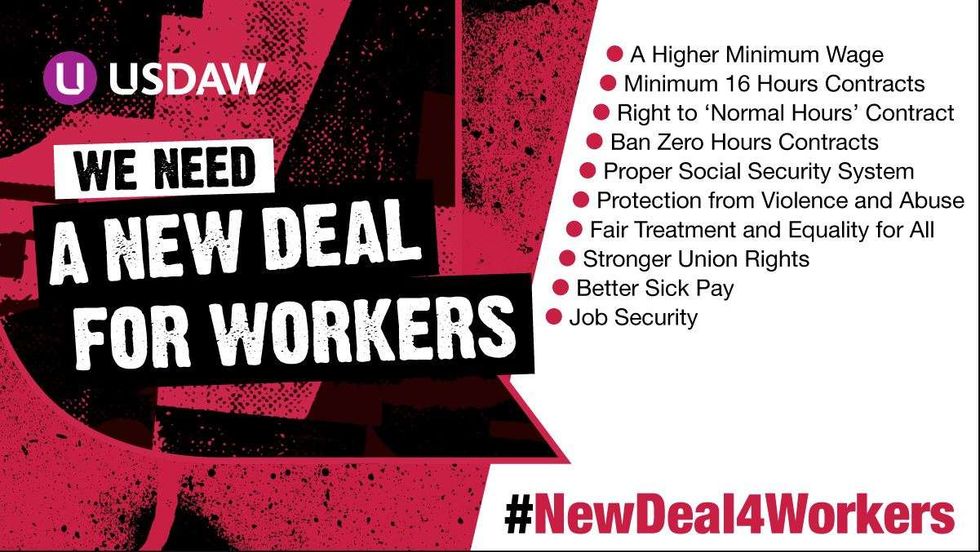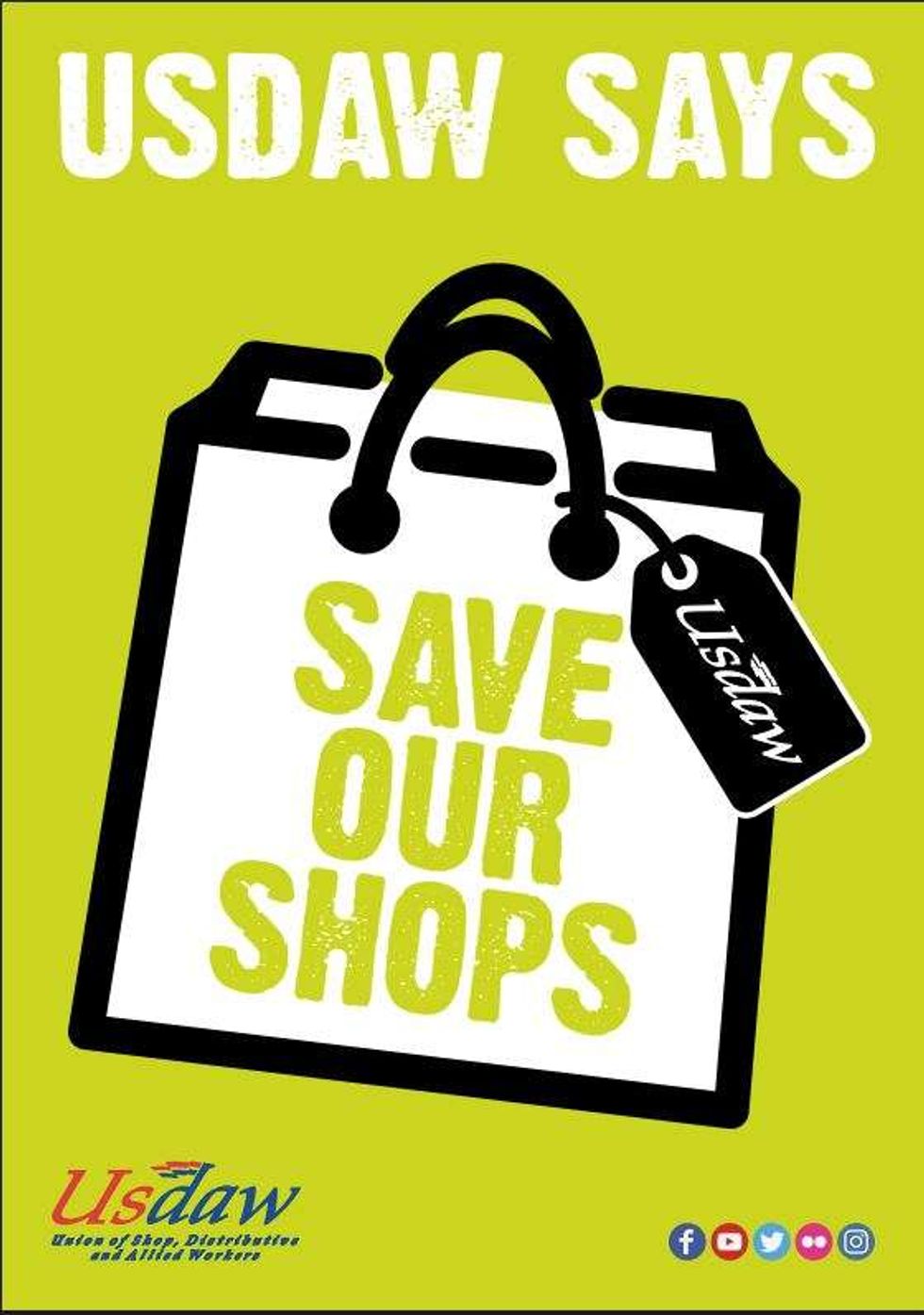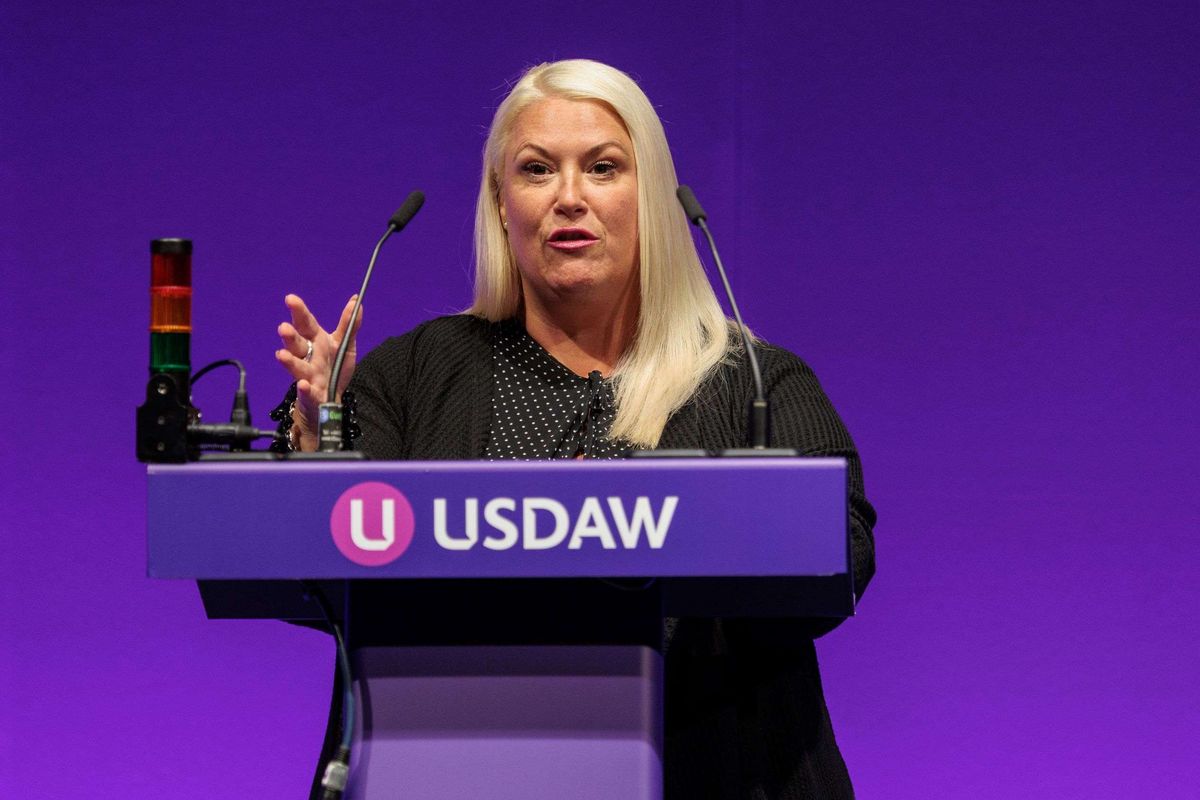It’s a big privilege to talk to Joanne Thomas, who is the new general secretary of shopworkers’ union Usdaw, and not only that but the first woman Usdaw GenSec ever, following the retirement of the legendary Paddy Lillis. Although Joanne said when she took up the role that Paddy would be a hard act to follow, it’s clear that no anxieties should be harboured on that score: Joanne is someone who has lived the union way all her life and knows the workplace and its issues inside-out, as I discovered during the course of our discussions.
Usdaw stands for the Union of Shop, Distributive and Allied Workers – a title that encodes the various amalgamations and conjoinings of smaller unions since the trade union movement itself was inaugurated 134 years ago and reflects the way the workplace has changed over the past century, with certain trades fading away and others evolving.
Usdaw is not so much a heavy industrial, extraction- or factory-workers' organisation, schooled in class conflict, shut-downs, walk-outs and political strikes. Instead, it contains artisans and warehouse people, customer-facing shop staff and back-office folk, and represents workers in all sorts of businesses and sectors that sell or get things to the public.
The road to GenSec
Asian Trader: Can you tell our readers a little bit about yourself and how you came to be where you are?
Joanne Thomas: To cut a long story short, I was a very young mother. I had my daughter when I was only 17 and I didn't realise before that, how important politics was. But very quickly I realised that politics mattered in relation to where I was going to live, what access to housing I had, transport, work, what the importance of an employee contract was.
Because when you're looking after somebody else, these things are crucially important. And as a young person, going into the workplace and found that I often got the worst shift. I was expected to do the longest hours at the shortest amount of notice, and so I very quickly joined Usdaw when I was 18, became a shop steward and started representing my colleagues.
I was very good back then at persuading others, young people in particular – who were notoriously difficult to recruit – of the value of being in the union, just by sharing examples of how it had benefitted me. I was very lucky to become a full-time officer when I was 21.
I was promoted at 30 to look after the Northeast, so I relocated to Leeds with my daughter, who was then 13, and I did that for the last 16 years – and then the rest is history!
I became the general secretary this year. My whole adult life has literally been dominated by industrial relations, politics and things that matter to working people, because I know what it's like to be really poor, to really struggle. That never leaves you.

AT: What comes across to me is that you're clearly a great communicator. You were out there talking to people and getting them to realise the situation that they were in and how to make it better for themselves.
Now you've taken over from Paddy Lillis, who had his style. How would say you're different and what are you going to do differently to Paddy?
JT: I think, with regards to style, Paddy was an absolutely fantastic leader, no two ways about it. But it's more than anything that I'm a woman, so I look at things differently. I look and feel like a lot of the members I represent, and I'm very familiar with the issues that affect women and minor groups, particularly from an equalities perspective.
From a leadership perspective, one thing that I know that I'm good at is communicating, and I'm not saying Paddy wasn't, by the way, because he was; but I think that's what I concentrate and make my legacy around – lots of listening as well as leading and making sure that I'm spending time with members and representatives in the regions, in the workplaces, and making sure our campaigns are really aligned with what's going on.
Law and order
AT: The convenience channel is a good place to work for mothers, part-time workers who perhaps look after children, and for young people as well. it gives the advantage of flexible working and all those sorts of things. But the big problem is that it's increasingly becoming a terrible environment in which to work – especially for women. What can the union do to help with the security and working conditions, and how can you get the government and the police to take more action to fight the crime wave?
JT: We've been campaigning for a standalone offense against shop workers for more than two decades, which has been in active Scotland for about four years now, and it's due under a Labour government to come into fruition in England. It can act as a great deterrent, similar to assaulting a police officer.
Everybody knows you don't do that because it can be a much heavier level of punishment, and in addition, we are very closely working with employers. They're the ones that carry the duty of care, making sure that workplaces are safe, which covers a broad range of things, whether it be body cams, having guards present, making sure that staff can park close to the stores rather than at the back of car parks, or having well-lighted environments of an evening.
We don't want anybody going into work feeling afraid. So, it's about making sure that we speak to the police, crime agencies, the employers, and have legislation in place to make sure that the retail worker is safe and doesn't feel scared about going to work.

AT: Usdaw’s way of working reminds me of the German method of partnership with employers, rather than a more confrontational, “We're the workers, you're the bosses” approach. Do you find that that still works? I'm asking particularly because the c-channel is generally small businesses where the workers are often in the same room with the owner all day. And our experience is that with very few exceptions, they get along very well, and it's a family atmosphere.
JT: Most of our agreements are consensual, where we have built membership up and communicated with the company to make sure that we get an agreement. We work solely in the private sector, and in addition to that, we need to recruit 100,000 members just to stand still every year. Because there are very transient workers.
We get the highest rates of pay in the sector when it comes to delivering, particularly for retail, the best employment packages; the best terms and conditions and safer workplaces, and that done with a very professional dispute resolution process. I would never criticise any of my sister unions ever, but I think what works for us is consensual agreements.
They're not all partnership agreements, they're also collective bargaining agreements, where the priority is delivering for members, and ultimately that is where we've seen success, where we can work together with employers because their biggest asset is their employees.
On occasion, we have to go through an industrial action process, but even where this is the case we've still managed to maintain professional relationships with employers.
AT: You really need to recruit 100,000 members a year, just to stand still? That alone must be a full-time operation.
JT: We have to operate very strategically and make sure that we are set up consistently throughout the regions, to make sure that we speak to non-members as well as members. This is why communication is crucial. Where we have agreements in place it means we also have access to workers. For example, in inductions, we can speak to employees and get them to join the union straight away.
AT: How's recruitment looking in the in the independent grocery sector? It would seem to be an attractive offer, especially because for some staff English is not their first language, and there are transient workers, as you say, who might otherwise assume that workplace rights and representation don’t apply to them.
JT: It all comes back down to communication and visiting stores, making sure that people are aware, first of all, that there is a retail union that's there for them. Because nine times out of 10 people still don't know how to access the union unless somebody has a conversation with them, approaches them, and discusses it.
Then we can give them options, if they prefer to join with payroll deduction or direct debit, we can talk to them about that. We can talk to them about their employment and all the issues that matter. Because unless you've got a shop steward or a workplace representative present, this isn't something that often crops up. It's not like anybody talks about it much unless you've got a trade union family!

A lot of people have joined thinking, ‘You know what, just in case something happens’. But retail work is often part time, so they are on much lower pay. People quite often think, ‘I'm not going to be here for very long’, and then we end up seeing them five or 10 years down the line, which is a very true pattern.
I want us to be an absolute powerhouse in the private sector, and I think we've lost our way with that. Statistically, we've lost our way of trade union dominance [in the workplace], and I want to make sure that it's a priority for me, to make sure that unions are seen as extremely relevant, and that we're a powerful force that speaks on behalf of workers, especially when there's so much division in workplaces and communities.
Workplace rights
AT: That segues nicely into the Employment Rights Bill that's going through Parliament now, following a period that encompasses Brexit, then Covid, and now a long-term cost-of-living crisis where the poor are becoming poorer.
But do you think that the Employment Rights bill is going to help? Can you explain to me what you think is achieved by it and what the difficulties might be. And then I'll rehearse a piece from the perspective of a small employer.
JT: The Employment Rights Bill is the biggest uplift workers have had in a generation. What we've got a responsibility to do, and what the Labour Party's got a responsibility to do, is make people aware of it, because even when I talk to some members in the workplace, they're not 100 per cent sure what the right Employment Rights Bill does.
We need to say to people that this is about your terms and conditions. It's about your contract, particularly the contract and the importance of that in retail, because it is very rare for an employee to get a full-time contract in retail, very rare.
You normally go in on a short-term contract, and you work literally whenever, at short notice, for a number of years, basically to prove yourself before you get a medium-hours contract, 16 to 20 hours, that is standard. But ultimately, you know, when it comes to people getting access to mortgages, to decent rates on loans, that all still comes down to what contract you are on.
If somebody's working a regular 40 hours and they've still got this 16-hour contract, that affects every element of their life, not just what they do: it affects their childcare, it affects what benefits they might be on, particularly in-work benefits and what access to housing and so on – purely because of that contract.
The important thing is not letting the Bill get diluted at any stage, so that access to a decent contract is at the heart of it. Because this is where the lowest paid workers can benefit the most, and the benefit for the Labour government is that they'll get more people out of in-work benefits. The Labour Party should not be sustaining Big Business by paying benefits.
Ultimately, there's a win-win. The other elements of the Employment Rights Bill are also fantastic for workers, like having access to sick pay from day one and not having to worry if you're really poorly and can't go into work because you can't afford to. And the abolishment of zero-hour contracts.

AT: Now let me present to you the point of view of the shop owner who has maybe a couple of full-time staff, two or three part-time staff, and cares about the employees and tries to pay them whatever she can afford, and give them the shifts that make it okay for them to pick up the kids from school or look after their mum or do whatever they've got to do.
What's happened now with the last budget is this: Retailers were on quite narrow margins, not a lot of profit, and they were just about keeping their heads above the water after lockdown and inflation and so forth. Then suddenly they have business rate relief removed and increases in National Insurance that they've got to pay for every worker, and then they have the minimum wage going up.
And what's happening to a lot of them now is that they're not making any money at all, so some have started to get rid of workers and just do the shifts themselves, where previously they might have tried to become more executive and expand – invest in another shop – and employ more rather than fewer people.
Well, they can't now, they've retrenched back into their own shop, working there themselves, behind the counter, because they can't afford to pay the shifts that they would have done before. Secondly, they're not going to recruit anybody else because they can't afford National Insurance. They can't pay the business rates; they can't raise their prices because the customers haven't got any money. So, from their point of view, the Employment Rights Bill is great for the workers, but the second order effect is you're not going to have so many workers. How does that help the workers? What would you say to that?
JT: First of all, for any trade union leader or any trade union official, our priority is always to keep members in work. That means you need an employer in a position where they make a profit and can provide secure jobs. So, I totally accept what you are saying in that regard.
You are probably aware that we have been very vocal with the Labour Party around having a reduction with regards to the rents and the rates, because we don't believe it's a level playing field, particularly for employers that are online. We believe that there should be a package that is giving answers to the questions you're posing, because we do not want communities without small employers and without crucial convenience stores.
I'll tell you why we'd be supportive of these additional measures that support small businesses. It's because it really helps Sunday trading, where the big stores close early, driving footfall to convenience stores on Sunday evenings, which is more than people might think, because I know that the profits tend to go up there, and that's a really good sort of compromise, and that that helps everybody. So, you know, we don't want that balance to be distorted.
AT: The government is talking about allowing supermarkets to remain fully open on Sundays.
JT Exactly. But for me, it is more about an industrial strategy that works, rather than diluting the Employment Rights Bill, because it isn't designed to put businesses out of business. It's about just creating fairness and a level playing field for workers.
It shouldn't be anything that any employee should fear. But the answer for me is – and I know this has been widely publicised, certainly from Usdaw – that the industrial strategy isn't favourable to small and medium employers, particularly with regards to the rent and the business rates. I think we and the business community are probably on the same page.
The next chapter
AT: My final question is, what do you see in the next three or four years? What will be the biggest issues affecting the workplace and the economy, and where do you think you're going to be fighting your biggest battles and making your biggest pushes in policy terms?
JT: The biggest issue will always be the cost-of-living crisis. We always want to make sure that we are robust around the negotiating table, delivering for our members. I appreciate everybody has bills to pay, employers as well, but ultimately, we'll be focused on making sure that our members’ voices are heard around implementing the Employment Rights Bill and making sure that this is recognised politically, that the Labour Party delivers something.
I am very concerned with the rise of Reform, I don't think they are any friend of the worker. I think that they cause division in communities, and I would hate to think that they get more political recognition.
We are the retail union. We very much encourage retail workers to join us, because we're very familiar with their working environment, and we provide excellent results for members. We improve our members' lives. We deliver statistically with higher rates of pay and safer working environments. Your concerns are our policies.


